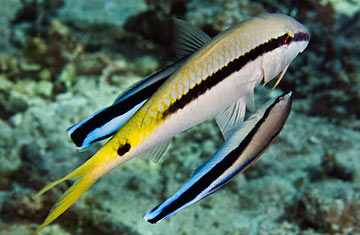
A Red Sea goatfish (Parupeneus forsskali) is followed by two bluestreak cleaner wrasses (Laboides dimidiatus)
Scientists often warn against anthropomorphism — the attribution of human characteristics to animals or even nonliving things. But it's hard to resist the charm of Labroides dimidiatus, a species of fish otherwise known as the bluestreak cleaner wrasse. These colorful little critters make their living in coral reefs by setting up cleaning stations where larger fish — often predators that might otherwise gobble them up — can stop by to have their skin cleaned. The wrasses busy themselves like car-wash attendants fussing around a sports car, nibbling off parasites, dead tissue and other blemishes and nourishing themselves in the process.
Since the discovery of the fish's behavior in the 1950s, cleaner wrasses have provided biologists with a delightful example of cooperation in nature. But now an international team of scientists has observed another unusual trait in the fish, one that may shed light on higher social animals, including humans. The wrasses, it appears, know how to punish one another.
It turns out that — surprise! — cleaner wrasses don't actually like to munch on dead flesh and parasites. They much prefer the slimy mucus that coats healthy fish skin, which is rich in carbohydrates. So in nature, the wrasses occasionally cheat and take a nip of their client's body. When they work alone, the wrasses strike a balance between cleaning and cheating so as not to lose their client's business. But wrasses also work in pairs. In these situations, explains Redouan Bshary of the Université de Neuchâtel in Switzerland — one of the authors of a new study in the journal Science, the fish face a dilemma: "Theoretically, the best idea would be to bite your client right away before your partner does, because if the client swims away, you get the benefits of the tasty bite, but the costs are shared." But the fish tend to behave themselves.
It's punishment — or just the threat of punishment — that's the key. Bshary and others already knew that in the wild, male wrasses, which are larger than females, become hopping mad when their partners steal a bite of their clients, and they often chase the female around in a threatening manner. To prove that this was indeed the physical scolding it appeared to be, Bshary and colleagues ran a tank experiment in which they introduced a plate of normal fish flakes (which wrasses like) and prawns (which wrasses love) to two fish. If either fish ate a tasty prawn, the researchers removed all the food from the tank. Sure enough, when the female nibbled the prawns, the male wrasse went berserk. As the experiment progressed, the females became less likely to eat prawns (but the males still ate the prawns with impunity).
The researchers believe the results are relevant to humans because they may offer clues to how humans evolved their own uniquely complex system of punishment. Despite the centrality of the concept of punishment to human society, evolutionary biologists are stumped as to what selective pressure would have led us to punish people who have cheated or harmed not the person who does the punishing but a third party — even if that party is not a genetic relation. Some biologists suggest that punishers benefit from a boost in social status and are thus more attractive as mates.
The cleaner fish may have another rationale — one that they also might share with us. The male cleaners probably punish females for biting the client because the male is a secondary victim — the client fish often swims away after being nibbled by the female, and the male wrasse loses his chance for lunch. This rationale, over the course of evolutionary eras, could have led to human society's more diffuse arrangements for punishment. "What we might be seeing is the origin of third-party punishment in human evolutionary history," Bshary says. The line connecting the male wrasse to our criminal courts may be a long and meandering one, but that doesn't mean it's not real.
